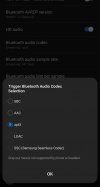I don't really agree. First I'm not sure you'd be able to hear any difference between LDAC and Aptx.
I personaly don't hear a difference between DAC usb lossless mode and aptx. So I don't think it would make that much of a difference. Even with the Stealth and my SOTA stack the sound is super close.
Second, I don't agree that the Bathys is not good in other areas. The microphone for calls might not be the best... but it's one of the best compared to other bluetooth flagships.
The noise cancellation is also pretty good, beaten by Sony it's true and bose maybe... but bose gives you the impression to be underwater... which i hate... and bathys don't. So bathys is better also in this area for me.
The only thing i don't like in the Bathys are:
- the unability to work in passive without turning them on
- not being able to be used while recharging
- no way to mute/unmute the microphone
And anyway LDAC is not lossless at all. Aptx Hd or aptx LL would be more interesting to add.
LDAC has 3 modes at 330, 660 and 990kbps and devices are rarely able to maintain a 990kbps link... which is not even enough to transmit a 1440kbps for uncompressed 16b/44khz signal ... neither a max compressed flac that would be around 1014kbps since 16/44 is not using 990kbps mode but 909kbps mode. The previous being reserved for 16b/48khz... and when you know that the ldac supports 32bits/96khz... how can someone think it's lossless and they invented a lossless compression that compress a music stronger than a text file.... Spoiler alert... it's not the case.
There's definitely a belief impact there vs a sound difference you would hear in a blind test between all these codecs and a wired really lossless experience.
I'm not saying the sound isn't different on the oscilloscope... but i'm saying that stating anyone hear the difference or that LDAC produces better result music wise or at least a better you can hear is not necessary true especially when in practice i've seen real world test that show most devices barely hold this codec in 330kbps most of the time.
If you check my last replies here you'll see that the Bathys is at least the closest wireless device to harman:
Hello, I thought it'd be nice to a a summary of the available products and information we have or lack. I didn't mention below headphones that are most certainly not qualified to be the best. If I forgot anything, please mention it. Model (candidates for best) Price (2nd hand) Audio Science...

www.audiosciencereview.com
even though i couldn't find any test for the T+A and the AT flagships.


